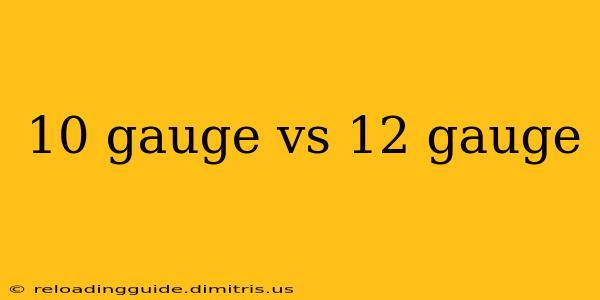Choosing the right shotgun gauge is crucial, impacting everything from recoil management to the type of game you can hunt. This in-depth comparison of 10 gauge and 12 gauge shotguns will help you decide which is the better fit for your needs.
Understanding Shotgun Gauges
Before diving into the specifics, let's clarify what "gauge" means. The gauge of a shotgun refers to the number of lead balls, each with a diameter equal to the bore diameter, that would weigh one pound. Therefore, a 10 gauge shotgun has a larger bore diameter than a 12 gauge, meaning it fires a larger shot. This seemingly simple difference has significant implications for the shooter.
10 Gauge: The Heavyweight Champion
The 10 gauge shotgun is a powerhouse, known for its massive stopping power. Its larger bore allows for the use of extremely large shot charges, making it ideal for hunting large game like elk or bear in close-range situations.
Advantages of 10 Gauge:
- Exceptional Stopping Power: The sheer size of the shot charge delivers devastating energy, making it highly effective for large, dangerous game.
- Longer Effective Range: While not as accurate as smaller gauges at extreme distances, its larger shot charge retains energy over longer ranges.
- Superior Penetration: Ideal for situations requiring deep penetration, such as hunting through heavy brush or thick hides.
Disadvantages of 10 Gauge:
- Significant Recoil: The substantial recoil makes the 10 gauge challenging for many shooters, especially those with less upper body strength or shooting experience.
- Weight and Bulk: 10 gauge shotguns are significantly heavier and bulkier than their 12 gauge counterparts, leading to fatigue during extended hunting trips.
- Limited Availability: Ammunition and guns in 10 gauge are less readily available and generally more expensive than 12 gauge options.
12 Gauge: The Versatile Workhorse
The 12 gauge is the most popular shotgun gauge globally, renowned for its versatility and wide range of applications. Its balance between power and manageability makes it suitable for various hunting scenarios and sporting clays.
Advantages of 12 Gauge:
- Wide Availability: Ammunition and shotguns are readily available and relatively inexpensive.
- Manageable Recoil: Generally manageable for most shooters, although recoil can still be significant depending on the ammunition used.
- Versatility: Suitable for hunting a wide range of game, from small birds to larger deer, and for various shooting disciplines like trap and skeet.
- Lightweight Options: Many 12 gauge shotguns are lighter than 10 gauge, reducing fatigue during prolonged use.
Disadvantages of 12 Gauge:
- Less Stopping Power than 10 Gauge: While powerful, it lacks the sheer knock-down power of a 10 gauge when hunting the largest game animals.
- Potentially More Recoil with Heavier Loads: While generally manageable, using heavier ammunition can result in significant recoil.
The Verdict: Which Gauge is Right for You?
The choice between a 10 gauge and a 12 gauge depends entirely on your specific needs and shooting experience.
-
Choose 10 Gauge if: You hunt large, dangerous game, require maximum stopping power, and are comfortable handling significant recoil and weight.
-
Choose 12 Gauge if: You need a versatile shotgun for various hunting applications, prioritize manageable recoil, want readily available ammunition, and are comfortable with a slightly less powerful, but still effective, option.
Ultimately, the best gauge is the one you can shoot accurately and comfortably. Consider renting or borrowing different gauges before making a significant investment. Consulting with experienced hunters or shooting instructors can also provide valuable insights to guide your decision.

